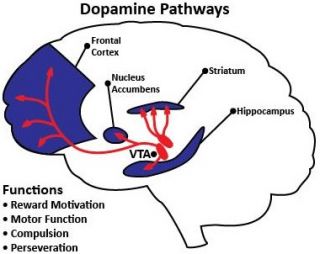
Without dopamine, we wouldn’t feel driven and motivated. But what happens when dopamine stops being a means to an end and turns into an end in itself? Dopamine has been blamed for many destructive behaviors of our modern lifestyle, making “dopamine fasting” the newest Silicon Valley craze. Is an excess of this neurotransmitter turning us into insensitive pleasure junkies or is the science a bit more complicated? Read on!
What is Dopamine?
Definition

Dopamine is a neurotransmitter, a chemical released by neurons (nerve cells) to send signals to other nerve cells [1].
Many areas of the brain produce dopamine. It is produced in the ventral tegmental area (VTA in the image above) of the midbrain, the substantia nigra pars compacta, and the arcuate nucleus of the hypothalamus [2].
The most important dopamine pathway in the brain controls reward-motivated behavior [1].
Most types of rewards, such as new experiences or accomplishments, can increase dopamine levels in the brain. In addition, most addictive drugs and behavioral addictions can increase dopamine [3].
In addition, dopamine has many other important roles in humans, including movement, memory, attention, learning, sleep, and mood [2].
Dysfunctions of the dopamine system contribute to Parkinson’s disease, schizophrenia, restless legs syndrome, and attention-deficit hyperactivity disorder (ADHD) [1].
Schizophrenia is characterized by high striatum dopamine, but abnormally low prefrontal dopamine activity [4].
Genetics Behind Dopamine
See this post for a more comprehensive guide on the genetics of dopamine.
- Dopamine D1 Receptor gene (DRD1)
- Dopamine D2 Receptor gene (DRD2) [5]
- Dopamine D3 Receptor gene (DRD3)
- Dopamine D4 Receptor gene (DRD4) [6]
- Dopamine D5 Receptor gene (DRD5)
- Tyrosine Hydroxylase (TH)
- Dopamine beta-hydroxylase (DBH)
- Catechol-O-Methyltransferase (COMT)
- D-amino acid oxidase (DAO)
- DOPA decarboxylase (DDC)
- Monoamine oxidase A (MAOA)
- Monoamine oxidase B (MAOB)
- Vesicular monoamine transporter 2 (VMAT2)
Cons of Excessive Dopamine
Dopamine levels are a marker of mental health. Low or high dopamine levels don’t necessarily indicate a problem if there are no symptoms or if your doctor tells you not to worry about it.
1) Plays a Role in Schizophrenia
Schizophrenia is characterized by negative symptoms such as apathy and poor social functioning, and positive symptoms, such as hallucinations and delusions [4].
The dopamine hypothesis proposes that schizophrenia is caused by excessive production of dopamine in the brain [7].
Studies support the idea that an overactive dopamine system may result in schizophrenia. Medications that block dopamine receptors, specifically D2 receptors, reduce schizophrenia symptoms [8].
Additionally, some evidence suggests that the negative symptoms and some of the cognitive deficits in schizophrenia may be related to lower prefrontal cortex function. This, in turn, may be associated with decreased dopamine activity. However, there is only indirect evidence to support this [9].
Thus, some features of negative schizophrenia (social withdrawal, apathy, and the inability to feel pleasure) are thought to be related to low dopamine levels in certain areas of the brain [2].
2) Can Drive Drug Addiction
Drugs such as cocaine, nicotine, and amphetamines act to increase dopamine in the striatum. This can lead to drug addiction [10].
The reinforcing effects of these drugs don’t only come about because of increased dopamine, but also because of the fast rate that dopamine increases. The faster the increase, the more intense the reinforcing effects [11]. This can reduce (“down-regulate”) the dopamine receptors over a period of time, causing increased need (“cravings”) for the drugs, as well as many other chronic problems.
Long-term drug use seems to be associated with decreased dopamine function. The reductions in D2 dopamine receptors and dopamine release in the striatum in addicted subjects supports this hypothesis [11].
3) Involved in Porn Addiction (and Other Behavioral Addictions)
Dopamine may contribute to compulsive sexual behaviors [12].
Both sexual experience and drugs act through dopamine D1 receptors (nucleus accumbens) [13].
Sexual novelty is compelling because it triggers bursts of dopamine in regions of the brain strongly associated with reward and goal-directed behavior. However, compulsive internet pornography users show a stronger preference for novel sexual images. Also, they get used to them more rapidly, which fuels the search for more novel sexual images [13].
In Parkinson’s disease, dopamine replacement therapies (levodopa, dopamine agonists) have been associated with compulsive sexual behavior and other impulse-control disorders [12]. Some patients reported uncharacteristic compulsive pornography use and had greater brain activity in response to sexual pictures, correlating with enhanced sexual desire [13].
Is porn addiction a problem? Some link porn to the increase in sexual performance problems and low sexual desire in men under 40. When a porn user has linked his sexual arousal to internet pornography, sex with desired real partners may register as “not meeting expectations”, resulting in a corresponding decline in dopamine, and erectile problems [13].
It is important to consider this question: are we, as a society, becoming “dopamine junkies”?
A lot of people today may succumb to “pleasure-maximizing choice behavior”. Some argue that we may be turning ourselves into mindless pleasure junkies, looking for the next dopamine shoot [14].
Basically, our choice behavior becomes biased towards short-term pleasure-maximizing goals, just as in the addicted brain and away from long-term prosperity and general well-being maximizing objectives [14].
4) Affects Weight
Dopamine, along with serotonin, opioids, cannabinoids, orexin, leptin, and ghrelin, mediates the rewarding effects of food [15].
It is associated with the desire to eat the food and with the conditioning of food cues. It is also involved with the motivation to perform the behaviors necessary to buy, prepare, and consume the food [15].
So, dopamine will cause you to desire food when you simply smell it. It causes you to ‘want’ food as opposed to just ‘liking’ the food [15].
Because dopamine is released when someone eats food, this could contribute to overeating. They will seek to increase their dopamine levels with food consumption which can cause weight gain and obesity [16], especially in people with low dopamine levels.
Dopamine is also associated with the motivation to alleviate negative emotions through eating. In both normal-weight and obese participants, emotional eating was associated with higher dopamine receptor D2R binding [17].
5) May Cause Aggression
High levels of dopamine can cause aggression. Blocking dopamine receptors decreases aggression in some people [18].
6) Decreases Empathy and Cooperation
Some observe that our modern society is a dopaminergic society. It is an extremely goal-oriented, fast-paced, and even manic society. Dopamine is known to increase activity levels, speed up our internal clocks, and create a preference for novel environments over unchanging ones [19].
On the other hand, high-dopamine individuals lack empathy and exhibit a more masculine behavioral style: conquest, competition, and aggression over nurturance and communality [19].
Increasing dopamine decreases empathy. In some human subjects, dopamine precursor levodopa increased the decisions to inflict pain on oneself and others for financial gain [20].
In a different study, people with the COMT 158Val variant, resulting in lower dopamine levels, showed higher cooperation compared to 158Met people with higher dopamine. Carriers of two 158Val variants (lower dopamine) are considered to be more helpful and empathic [21].
7) Can Cause Constipation
While dopamine can help with gut function, it can also cause constipation in some patients [22].
Dopaminergic medications in Parkinson’s disease can increase constipation risk [23].
8) May Cause Vitamin B6 Deficiency
Dopamine has been found to alter the requirements and storage mechanisms of vitamin B6, suggesting that excess dopamine can lead to vitamin B6 deficiency in certain individuals [24].
Takeaway
Dopamine is an important neurotransmitter. Without it, we probably wouldn’t be able to feel focused, creative, driven, and curious.
However, too much dopamine might make us seek pleasure no matter what–doing more harm than good. In excess, dopamine seems to propel various types of addictions–from drug addiction to porn addiction to addictive behaviors characteristic of our fast-paced, goal-driven lifestyle. Eventually, addiction may blunt the brain’s dopamine pathways.
Additionally, excessive dopamine activity is also hypothesized to contribute to schizophrenia and a lack of empathy.
Still, much of the existing research was in animals or dealt with associations only. More work is needed to determine whether dopamine excess can directly cause addiction and other issues in humans.


